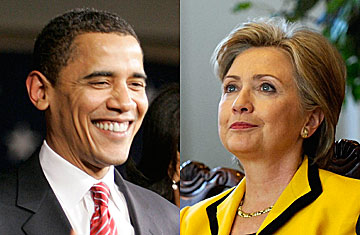
Barack Obama and Hillary Clinton.
As Hillary Clinton and Barack Obama head into what some have jokingly called "sub-super Saturday," both presidential candidates are focused on Washington State, which, out of the quartet of primary contests to be held this weekend, offers the largest delegate haul.
Louisiana, Nebraska and the Virgin Islands also hold contests on Saturday, but none of them can match Washington's 97 delegates. So, hoping to boost her chances at a time when polls have shown her lagging behind here, Clinton was the first to the local rope lines, arriving in Seattle late Thursday evening and heading immediately to a gritty corner of the city's port, where she told about 5,000 people gathered in a hangar-like cruise ship terminal that they needed to elect a President who will be "a fighter, and a doer, and a champion for the American people." She took a shot at Obama, who was set to hold a large rally in Seattle's NBA basketball stadium on Friday morning, suggesting that his calls for unity were not grounded enough. "I am hoping to unify the country," Clinton said. "But to unify it to do the work of the country, not just to unify it for the sake of saying, 'We're unified.' ... We need to be unified with a common purpose. The purpose is progress."
On the table in Washington are 80 delegates that will apportioned through Democratic caucuses. Behind the scenes, plays are also being made for the loyalty of Washington's 17 super-delegates, nine of whom remain undeclared even as political number-crunchers increasingly say that super-delegates could end up deciding the close race for the Democratic nomination. Clinton made a point at her Thursday evening rally of touting one her newest super-delegate endorsers, Washington Rep. Norm Dicks, but the Clinton rally was also notable for the absence of one prominent super-delegate who had said she would make her decision before the caucuses on Saturday: Washington Gov. Christine Gregoire.
The state's two Senators, Maria Cantwell and Patty Murray, both super-delegates, have endorsed Clinton. A Gregoire endorsement would have made it a Clinton sweep of the state's female triumvirate, a symbolically resonant coup. But the governor, having bypassed the opportunity to endorse Clinton on Thursday night, is endorsing Obama. On Friday, she appeared at Obama's side at the candidate's rally at Key Arena, which was filled to capacity with about 18,000 people. About 3,000 more occupied overflow space outside.
Turnout is likely to be high at the Washington caucuses this weekend. State Democratic Party chairman Dwight Pelz has said he expects last cycle's turnout of about 100,000 people to be dwarfed. The turnout may be as high as 200,000.
However, there is considerable confusion about the process, and the state party admits to being "overwhelmed" by calls from Democratic voters seeking guidance. Washington, in an arrangement that even local political leaders find bizarre, has both a caucus on Feb. 9 and a primary on Feb. 19, meaning that voters are currently staring at mail-in primary ballots at the same time as they're trying to figure out their caucus locations. Even more confusing, Democrats use only the caucuses to apportion delegates, making the primary effectively meaningless for them, while Republicans use the caucuses to apportion 19 of their 40 delegates and their primary to apportion the rest. (The situation has an acrimonious, and convoluted history that involves a controversial victory by televangelist Pat Robertson in the state's 1988 Republican caucuses, which prompted an intervention by the state legislature that resulted in the still unresolved caucus-and-primary problem.)
Clinton poked fun at this state of affairs on Thursday evening, provoking loud and knowing laughs from her Seattle audience. She then urged her supporters to ignore their meaningless primary ballots and instead focus on caucusing. "I need you to find where your caucus site is and to go and stand up for me," Clinton said. "If you stand up for me for a couple of hours on Saturday, I will stand up for you throughout this campaign."
It is not clear that even this kind of in-person urging will be enough to give Clinton a win in Washington. Obama has raised close to twice as much money as Clinton here, and on Wednesday the state's largest union, the Service Employees International, endorsed him. Its membership is equal in number to the entire turnout of the 2004 Democratic caucuses. On a conference call announcing the endorsement, Washington Rep. Adam Smith, one of Obama's few superdelegates, said he expected Obama to win the state. "We are very confident in getting our people out and having a very strong showing on Saturday," Smith said.
